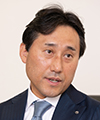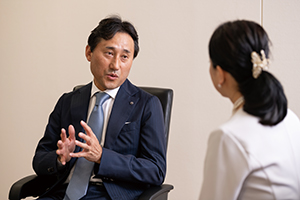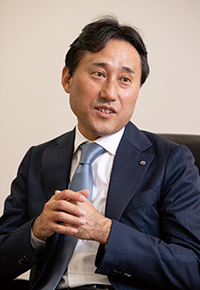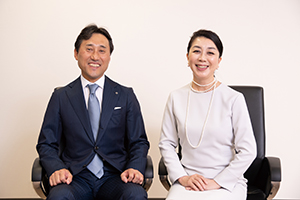 |
|
|
|
|
|
View from the Top Vol. 18, No. 1, pp. 1–5, Jan. 2020. https://doi.org/10.53829/ntr202001tp1
Get to the Heart of the Matter without Being Distracted by Superficial Events—Creating New Value with the NTT WEST SpiritOverviewInformation and communication technology related to data utilization, such as Internet of Things, big data, and artificial intelligence, is key to Japan’s sustainable development. With regard to contributing to the local economy, solving regional problems, and improving the attractiveness of the region, how is the knowledge of NTT WEST—which has a wide variety of markets—used? We asked Ichiro Uehara, senior executive vice president, NTT WEST, about the company’s innovative initiatives and prospects in various locations in western Japan. Keywords: regional revitalization, ICT solution, disaster response Improve attractiveness of various regions and work on solving local problems—Could you tell us about the current situation concerning NTT WEST Group? Since 2018, Japan has suffered many natural disasters, such as typhoons and landslides, and both NTT EAST and NTT WEST have been busy responding to them. I’d like to express my gratitude for the efforts of all those who worked hard on these responses. Although expenses for responding to disasters for NTT WEST are increasing, we made an operating profit of 118.3 billion yen for fiscal year 2018 (ended March 31, 2019), which is beyond our target thanks to the efforts of employees. Unfortunately, operating revenues declined by 31.7 billion yen compared to the last fiscal year. NTT WEST celebrated its 20th anniversary in 2019; however, its revenues have continued to decline since its inception. To shift this decrease to an increase, a medium-term management plan was set up in the fall of 2018 to achieve operating revenues of 1.5 trillion yen and an operating profit margin of 10% by 2025. A major issue concerning increasing revenues is how to increase revenues in growth fields such as corporate business operations. Supporting this effort is our connection with local customers—which we have cultivated over many years. We are taking up the challenge of creating new services and business models on the basis of two phrases, “community-focused approach” and “ICT (information and communication technology) solutions.” NTT WEST covers 30 prefectures and 12 government-designated cities, which form an economic zone divided into six blocks. We are in a challenging environment in which we compete with companies, including electric power corporations, in each block. To respond to such competitive environments, we have branch managers in those 30 prefectures who shrewdly confront issues in their areas while working on regional revitalization initiatives that match the characteristics of each region. As a first attempt to boost this kind of initiative, our Regional Revitalization Promotion Meeting was held in September to bring these 30 branch managers together and discuss the regional revitalization plans and ideas that they were considering. In addition to discussions on common issues such as the use of tourism resources and population decline, the managers actively exchanged opinions and raised interesting ideas, such as using drones for home delivery, promoting e-sports, and implementing digital transformation in agriculture and forestry. Some of these initiatives have already begun. For example, in the Kyoto area, NTT WEST has begun providing a cloud service platform called Regional Revitalization Cloud to Ryukoku University. Using this platform, we are working together with the university to resolve issues such as operational reform and improvement of student services. In the Kumamoto area, we are participating in the Kumamoto Urban Strategy Meeting and Working Group on Regional Revitalization to reconstruct urban areas after the 2016 Kumamoto earthquakes and pursue urban design for 2050. We are working to solve social problems by promoting tourism, revitalizing local communities, and reforming work culture, through the use of ICT. I’d like to continue working closely with customers to solve social problems by leveraging our strengths, namely, “community-focused approach” and “ICT solutions.” What’s more, our customers’ problems are diversifying, and an increasing number of problems cannot be solved by ICT solutions alone. We are therefore also focusing on providing solutions as a combination of ICT solutions and business process outsourcing (BPO) services. For example, our group company NTT Marketing Act has long focused on the contact-center business. As well as simply undertaking telephone-operator work of customers, it provides a combination of services that collect voices of customers (VOC) through the work of telephone operators and executes VOC analysis using artificial intelligence (AI) technology. This analysis gives our customers feedback on knowledge necessary for developing products and improving management. By combining ICT solutions and AI technology with BPO services in this manner and providing them as total value, we hope to devise solutions for more fundamental problems concerning regions and customers.
—Expectations for ICT seem to be on the rise as major sports events continue to be held in Japan into 2020. What has NTT WEST prepared for such events? International customers have many opportunities to visit western Japan for sporting events. Accordingly, in addition to creating a basic environment in which information is provided to them (through signage and other means) at locations they may visit, we are helping them with their sightseeing plans. For example, we are promoting initiatives that take advantage of the characteristics of each region. Such initiatives include providing information about night spots in Osaka and multi-language sightseeing tours in Kyoto and Nara. In the future, international events, such as Expo 2025 Osaka, Kansai, and integrated resorts will be attracted to western Japan. With this trend in mind, I feel that the expectations of customers in local governments and the business community regarding the NTT Group are growing. As in the case of a 5G (fifth-generation mobile communication) pre-commercial service offered last fall, I’d like to take up the challenge of conducting field trials of new technologies and services, such as NTT’s Innovative Optical and Wireless Network (IOWN), using such international events as test fields. There are limits to how we alone can solve problems; accordingly, it is important to collaborate with various partners in creating and providing new business models by combining our respective strengths. Our mission is to pursue communication and reality—What is important concerning your efforts to meet the expectations of customers? I value the six action guidelines, collectively called NTT WEST Spirit, set forth in the corporate philosophy of NTT WEST Group. These guidelines are “Our attitude is customer first”; “The starting point is self-reliance of the individual”; “That which is usable is wisdom”; “The driving force is communication”; “Growth means innovation every day”; and “To aim for is to be professional.” Of those guidelines, I especially value “The starting point is self-reliance of the individual” and “The driving force is communication.” NTT WEST was established as a result of the reorganization of NTT in 1999; however, it has been in the red since its establishment, and getting into the black has been a major challenge. To work hard in such an environment and build up a track record, employees are encouraged to communicate with each other on the basis of an attitude of having a solid “individuality” but move in the same direction. The phrases “The starting point is self-reliance of the individual” and “The driving force is communication” express our desire to do so. I think these two phrases are also very important from the viewpoint of meeting our customers’ expectations. There are many opportunities to interact with customers, and such opportunities enable the learning of common practices and cultures outside our company, allowing me to increase my awareness. However, it is not just one-sided; from our side, we can provide customers with useful and interesting information. In this manner, our relationship will continue to flourish by deepening our mutual communication, and I think this relationship will become the seed of new business. I believe that to build good relationships with customers and meet their expectations in this manner, we must embody and implement the corporate philosophy expressed in the NTT WEST Spirit; specifically, “The starting point is self-reliance of the individual” and “The driving force is communication.”
—You are taking initiative to practice the NTT WEST Spirit. Japan in recent years has experienced several natural disasters, and what is being laid out in the NTT WEST Spirit is being exercised in response to such disasters as well as in response to customers. The first major disaster I experienced in my professional life was the Great Hanshin-Awaji Earthquake in 1995. I was in Tokyo at that time, so I went to the region immediately after the earthquake as a member of a team tasked with creating a recovery plan. When thinking about how to restore information and communications in a city where buildings were heavily damaged or destroyed, the disaster message board service was born from the idea that if telephones are disconnected, then the communication messages should be stored. After several years, I was dispatched to the NTT EAST earthquake response headquarters as a liaison officer during the Great East Japan Earthquake in March 2011. Unlike the experience of the Great Hanshin-Awaji Earthquake, the lessons learned from this more recent disaster—in which everything had been destroyed by a tsunami—were the need to review base-station placement and cable routes as well as implement waterproofing measures. Furthermore, after the Great Hanshin-Awaji Earthquake, one countermeasure was restoring telephone connections; however, after the Great East Japan Earthquake, our service expanded to supporting restoration of Wi-Fi connections as well as telephone lines. As I am in charge of the Kyushu area, I experienced the Kumamoto earthquakes in 2016; however, at that time, cables that we thought would be okay because they were buried underground were severed by the earthquakes. Over 20 years have passed since the Great Hanshin-Awaji Earthquake, and even though services and technologies are progressing, we cannot help but feel helpless in the face of nature. For such disaster countermeasures, teams with clear divisions of roles are formed under the head of the disaster countermeasures headquarters. In addition to sharing overall information, communication between each team is also important. At the same time, in some situations, each restoration site is in a race against time; therefore, frontline judgments and communication with others are crucial. I think that through these experiences, we have cultivated actions based on “The starting point is self-reliance of the individual” and “The driving force is communication.” Our aim is to make customers think they can do something new with NTT by their side—Would you like to say a word to your engineers and researchers? And would you tell us what is required of them. While dealing with customers, we have many opportunities to think about what kind of services to offer and how to use ICT. Projects and services, such as regional revitalization and BPO, need to be centered around customers and local communities and provide services and products from a market perspective. I’d like our engineers and researchers to pursue research and development with the market in mind. We are discovering and collecting market needs and working with customers to solve local problems. I want our engineers and researchers to shrewdly address these needs and become connoisseurs of technology while conducting their research and development. Then, we, the front office, will work closely with them to create services and products that resonate with the market. I think that the expectations society has of the NTT Group are large and diverse. I want to offer IOWN and technologies to create smart cities and make our customers feel “That’s as expected from NTT” and realize that “We can do something new with NTT by our side.” By collaborating with customers as business partners, our potential will surely expand.
—What kind of efforts will NTT WEST promote in the future? We are focusing on supporting digital transformation of our customers. There are two aspects to this. One is to assist in the analytics and utilization of digital data when creating business and services as customer business. Customers do not necessarily have human resources well versed in technology for promoting digital data utilization. Even if they know the problem, they may not know how to solve it. In response to this situation, in August 2019, we established a co-creation lab called “LINKSPARK” for coordinating our customers’ businesses using digital data and providing an environment necessary for experimentally verifying ICT solutions. In that environment, we provide hardware, datacenters, cloud services, and other assets for investigating new businesses, and full-time data scientists and AI consultants support data analytics based on design thinking. We are already working with customers in the relocation industry on a wide range of themes, such as standardizing moving and relocation service plans and promoting skill transfer, and with disaster-insurance customers on using AI to forecast call-center staffing/scheduling during disasters. With the intent of constantly increasing customer value, we will continue to expand and promote such endeavors. The other focus is to help advance digitization of business processes used in customer businesses. Last August, we released a service that visualizes work process using AI. Installing dedicated software on customer’s personal computers (PCs) enables AI to automatically collect and analyze PC logs, visualize customer’s work, and provide reports that can be used for continually improving the running of companies and supporting risk management. For example, as a result of analyzing reports, if it is determined that certain customer work is taking a lot of time due to repetition, introducing robotic process automation, such as WinActor, can greatly improve the efficiency of that work. Moreover, if it is determined that a lot of tasks involve printouts, it is possible to recommend a service called AI-OCR (optical character recognition) that reads handwritten slips and converts them into electronic data. In this manner, I’d like to support our customers’ businesses by proposing and consulting on optimal digital transformations that are suitable to the business processes of our customers. Interviewee profileCareer highlightsIchiro Uehara joined NTT in 1988. He served as president and representative director of NTT Neomeit from 2013 to 2017. He has been the director of the Corporate Business Headquarters of NTT WEST and president and representative director of NTT Business Solutions since 2017 and became senior executive vice president of NTT WEST in July 2019. |
|












